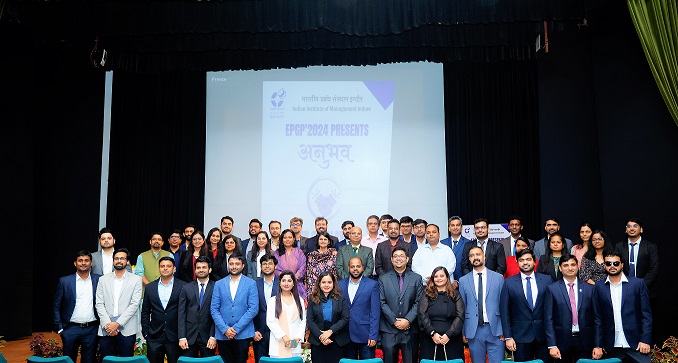IIM Indore’s Executive Post Graduate Programme in Management (EPGP) Batch 2023-24, conducted Anubhav – The HR Conclave on August 19, 2023. The event witnessed some insightful interactions on the themes Constructing a Leadership Pipeline: Uncovering and Cultivating Future Leaders; and Human Capital 2.0: Redefining HR in the Era of Automation, AI, & Flexible Scheduling. The event was inaugurated by Prof. Himanshu Rai, Director, IIM Indore.

During his welcome address, Prof. Rai illuminated the profound shifts in our modern world, encapsulating the essence of a VUCA environment – one characterized by Volatility, Uncertainty, Complexity, and Ambiguity. He drew a clear line between the elements that can be predicted and managed, such as the volatility in educational preferences driven by technology advancements like AI and ML, and those that remain beyond prediction, like the uncertainty posed by unforeseen events such as the COVID-19 pandemic. Prof. Rai acknowledged the fear instilled by this VUCA world, often fueling the ‘Fear of Missing Out’ (FOMO), which drives individuals to chase success based on external benchmarks and peer comparisons. He highlighted a transformative shift in defining success, from external comparisons to introspective self-assessment. “This perspective on success has evolved to encompass one’s journey, progress, and alignment with personal vision”, he said.

He introduced a metaphorical “COIN” of success with its multi-faceted sides: Conscientiousness, emphasizing discipline, time management, and avoidance of procrastination; Openness, advocating the value of shared wisdom over guarded knowledge; Integrity, urging leaders to foster open dialogue and reflective listening; and Networking, recognizing that diverse connections and interactions amplify leadership effectiveness. “Break the habit of attracting similarity and foster relationships to build networks across different backgrounds and cohorts”, he said. Success is no longer just an external pursuit, but an internal journey marked by growth, authenticity, and the prudent use of the multifaceted “COIN” of qualities, he added.
The event witnessed two panel discussions. The first panel discussion was on the theme Building a Leadership Pipeline: Identifying and Developing Future Leaders. Moderated by Prof. Ranjeet Nambudiri, Faculty, IIM Indore, the panel had some brilliant insights from Dr. Niharika Rai – Group Head of HR, P&ES (Thermax), Mr. Rahul Mittal – Head of Strategy (Emerging Markets), Dr. Reddy, and Mr. Satish Rajarathnam – Senior Vice President of HR, Mphasis. Prof. Nambudiri emphasized that leadership transcends mere skill and decision-making. He highlighted the abundance of knowledge available for leadership development and talent management, acknowledging the continuous learning journey that leadership entails.
Mr. Rajarathnam highlighted the pandemic’s role in fostering a growth mindset and resilience. He questioned how to uphold organizational values in a predominantly hybrid work landscape, acknowledging the evolution of managerial leadership. He emphasized empathy, responsiveness, effective time management, and result orientation as key while noting the growing significance of saying no and maintaining motivation among leaders.

Dr. Niharika Rai said that mindset and culture are the most important for leadership development. It is also critical for the employees to introspect and identify leadership skills within themselves. As per Dr. Rai, leadership is not a one-time task but a daily practice involving the utilization of resources. She also talked about the utilization of technology and how it is being adapted for gigs.
Mr. Mittal added that leadership approaches involve both top-down and bottom-up approaches. Value identification, skills, and identification of people with skills are required in both approaches. He also focused on the importance of learning and development in organizations and the use or adaptation of technology in the learning space. He shed some light on using predictive analysis in recruitment and on boarding.
The second panel discussion centered on the theme “Rethinking HR in the Age of Automation, AI & Flex Schedule.” Esteemed panelists included Mr. Balaji Kumar, Chief Human Resources Officer at Sonata Software; Ms. Rishu Garg Gehani, Head of HR at DeHaat; and Mr. Anirban Das, Chief People Officer – HR at Lakshmikumaran and Sridharan. The engaging discourse was skillfully moderated by Prof. Nishit Kumar Sinha, Faculty, IIM Indore, addressing the dynamic intersection of HR practices with automation, AI, and flexible scheduling.
Mr. Kumar talked about the various forces shaping the HR 2.0 ecosystem. He highlighted how social institutions are breaking, the rise of totalitarian regimes, and the increasing power of corporations are redefining workplaces. “There is an even more need for diversity and inclusion. In a world of uncertainties, the world is now transitioning from VUCA to BANI (Brittle, anxious, nonlinear, and incomprehensible), and this concept helps us decode what is happening in the world around us”, he said. HRs need to develop proactive solutions and roadmaps for the new overwhelming world. He also talked about Responsible AI as a crucial aspect for HR leaders to help curb the drawback of AI and democratize information for the employees.
Ms. Rishu Garg quoted examples from the agriculture industry, and how technology has revolutionized the industry to predict and increase farmers’ yields. She highlighted that AI is acting as an enabler and helping shorten the feedback loop and personalize the experience in management. “Tools in HR help do a lot more in less amount of time. Leaders need to adopt technology to assist in augmenting skills”, she said.
Mr. Das spoke about the fact that the law landscape has changed with the advent of technology, making its arguments stronger, saving time and increasing efficiency, thereby reducing the time to review legal contracts or translate them into other languages. Predictive analysis helps to make the legal industry data-driven using AI as an enabler. “Bots can’t replace the touchpoints with the employees as human interaction is critical. The HR should communicate to the employees that AI is an enabler rather than here to replace them”, he said.
The event came to a conclusion with a vote of thanks by Prof. Saurabh Chandra, Chair, EPGP. Engaging dialogues on embracing change, fostering resilience, and harnessing the potential of technology painted a comprehensive picture of the evolving corporate world. Attendees were enriched with a wealth of knowledge, emerging from the amalgamation of diverse viewpoints and innovative ideas. The event served as a valuable platform for fostering growth, networking, and equipping attendees with the tools needed to thrive in an ever-changing professional landscape.


